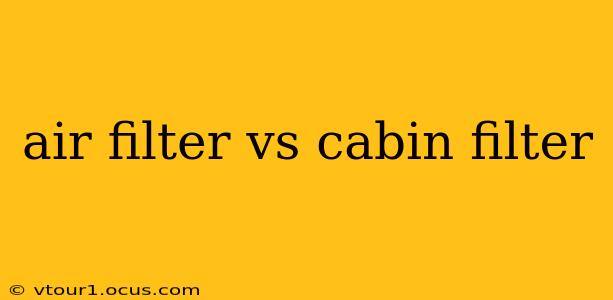Choosing the right filter for your vehicle is crucial for both performance and health. Many car owners confuse the air filter and the cabin air filter, leading to potential issues down the road. This comprehensive guide clarifies the key differences between these two essential components, helping you understand their functions and why regular replacement is vital.
What is an Air Filter?
The air filter is located in your engine compartment and protects your car's engine. Its primary function is to filter out dirt, dust, pollen, and other contaminants from the air entering the engine. A clogged air filter restricts airflow, leading to reduced engine performance, decreased fuel efficiency, and potentially even engine damage. Think of it as the engine's "lungs"—it needs clean air to breathe and function properly.
Key Characteristics of an Air Filter:
- Location: Engine compartment
- Function: Filters air for the engine.
- Impact of Clogging: Reduced engine performance, fuel inefficiency, potential engine damage.
- Replacement Frequency: Typically every 12,000-15,000 miles (or as recommended by your vehicle's owner's manual).
What is a Cabin Air Filter?
The cabin air filter, also known as an in-cabin air filter or pollen filter, is located inside your car's ventilation system, usually near the blower motor. Its job is to clean the air that circulates inside your vehicle's cabin. This filter removes allergens, pollutants, and other particles from the air you breathe while driving, improving the air quality and protecting your respiratory health.
Key Characteristics of a Cabin Air Filter:
- Location: Inside the vehicle's ventilation system.
- Function: Filters air for the passenger compartment.
- Impact of Clogging: Reduced airflow, unpleasant odors, potential for increased allergens and pollutants inside the vehicle.
- Replacement Frequency: Typically every 12,000-15,000 miles (or as recommended in your vehicle's owner's manual), but may need more frequent replacement depending on environmental conditions.
How Often Should I Replace My Air Filter and Cabin Air Filter?
The recommended replacement intervals for both filters vary depending on your vehicle and driving conditions. Consult your owner's manual for specific recommendations. However, a good rule of thumb is to replace them every 12,000-15,000 miles. If you frequently drive in dusty or polluted areas, more frequent replacements are advisable. You'll also notice reduced airflow from your vents (cabin air filter) or a decrease in engine performance (air filter) that could signal it's time for a change.
What Happens if I Don't Replace My Air Filters?
Neglecting to replace your air filters can have several negative consequences:
- Air Filter: Reduced engine power, poor fuel economy, increased emissions, and ultimately, potential engine damage.
- Cabin Air Filter: Reduced airflow from the vents, musty odors, increased exposure to allergens and pollutants, leading to potential respiratory problems for passengers.
How Can I Tell if My Air Filter Needs Replacing?
Visual inspection is often the easiest way. If the air filter is visibly dirty or clogged, it's time for a replacement. For cabin air filters, look for signs of dirt buildup or a musty smell coming from the vents. You can also check your owner's manual for specific instructions.
Can I Replace My Air Filters Myself?
Replacing both air filters is generally a straightforward DIY task, although the location and access may vary depending on your vehicle model. Consult your owner's manual for instructions and diagrams. If you're uncomfortable performing this task yourself, your local mechanic can easily replace them for you.
What are the Different Types of Air Filters and Cabin Air Filters?
There are various types of air filters available, each with different filtering capabilities and materials. Some common options include paper filters, high-efficiency particulate air (HEPA) filters, and synthetic filters. The best option depends on your specific needs and preferences. Similarly, cabin air filters vary in filtration efficiency, with some focusing on odor control or allergy relief.
By understanding the distinct roles of the air filter and cabin air filter, you can ensure your vehicle is running efficiently and you're breathing clean air while driving. Remember to consult your owner's manual for specific maintenance schedules and recommendations for your particular vehicle model.
